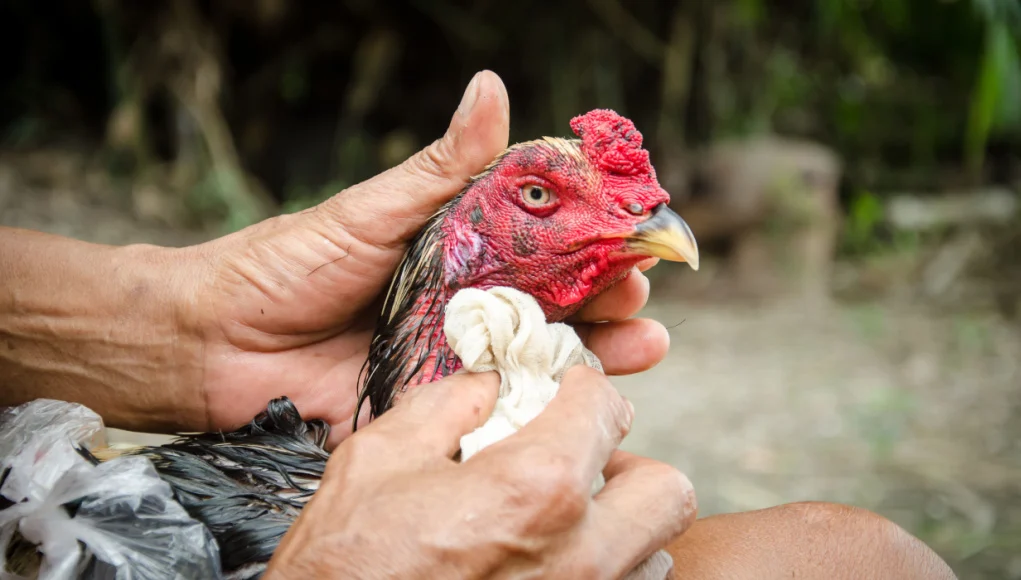Online Chicken Wound Treatment & Care from Home
Online chicken wound treatment consultation - only $65. Get expert virtual vet care for your flock's wound care without leaving home.
TALK TO A VET

Understanding different types of wounds helps in providing appropriate care: 1. Pecking Injuries • Often occurs due to bullying or stress • Can range from minor to severe • Most common in overcrowded conditions • May lead to more serious issues if untreated 2. Predator Attacks • Can cause deep wounds and trauma • May require immediate emergency care • Risk of infection is high • Often needs comprehensive treatment 3. Accidental Injuries • Cuts from sharp objects • Scrapes from rough surfaces • Injuries from getting caught in fencing • Falls or collisions
Quick assessment of wounds is crucial for proper treatment: Emergency Signs: • Heavy bleeding or deep wounds • Exposed muscle or bone • Signs of infection (swelling, pus, odor) • Behavioral changes (lethargy, loss of appetite) Less Urgent Signs: • Minor pecking wounds • Small cuts or scrapes • Superficial injuries • Normal behavior maintained All wounds should be monitored closely as they can quickly become more serious in chickens.
Our veterinary team provides comprehensive wound care solutions: 1. Professional Assessment • Virtual examination of wounds • Severity evaluation • Treatment priority determination • Infection risk assessment 2. Treatment Plans We develop specific treatment protocols including: • Appropriate cleaning methods • Antibiotic recommendations • Pain management strategies • Wound dressing techniques 3. Ongoing Care Instructions • Step-by-step wound cleaning guide • Proper bandaging techniques • Medication administration • Recovery monitoring 4. Prevention Strategies • Coop safety improvements • Flock behavior management • Predator protection advice • Environmental modifications
Essential wound care practices for chicken owners: 1. Immediate Response • Clean the wound area • Stop any bleeding • Isolate injured birds • Provide quiet, safe recovery space 2. Wound Care Basics • Use appropriate antiseptics • Keep the wound clean • Monitor for infection • Follow treatment schedule 3. Recovery Support • Ensure proper nutrition • Maintain clean environment • Reduce stress factors • Monitor healing progress
Contact Telavets immediately if you notice: • Severe bleeding that won't stop • Deep wounds or punctures • Signs of infection (swelling, discharge, odor) • Significant behavior changes • Loss of appetite or lethargy • Wounds near vital areas Quick professional intervention can prevent complications and ensure proper healing. Our veterinarians are available to provide prompt guidance and treatment plans.
In my 18 years of poultry practice, I've developed a specific wound cleaning protocol that significantly improves healing outcomes. First, I always recommend chlorhexidine solution (0.05%) over hydrogen peroxide - while peroxide looks impressive with its foaming action, it actually damages healthy tissue and delays healing by 24-48 hours in my clinical experience. My standard protocol starts with gentle irrigation using saline or clean water to remove debris. I then apply chlorhexidine using a soft cloth, working from the center of the wound outward. This technique prevents introducing bacteria from surrounding areas into the wound. For deeper wounds, I guide owners through a two-stage cleaning process. Stage one removes visible contamination, then after 10-15 minutes, we perform a more thorough cleaning. This approach reduces tissue trauma while ensuring proper decontamination. What many owners don't realize is that wound cleaning frequency matters enormously. For fresh wounds, I recommend cleaning 2-3 times daily for the first 48 hours, then once daily. Over-cleaning can actually impede healing - I've seen cases where excessive cleaning delayed healing by a full week. The key is gentle technique combined with appropriate antiseptics. Aggressive scrubbing destroys the delicate granulation tissue that's essential for proper healing.
Secondary infections are my biggest concern with chicken wounds because they can turn a minor injury into a life-threatening condition. In my practice, I see secondary infections develop in about 40% of untreated wounds, but this drops to less than 8% when proper prevention protocols are followed. Environmental control is absolutely critical. I always recommend immediate isolation of wounded birds because other chickens will peck at wounds, introducing bacteria and preventing healing. I've seen minor cuts become serious infections within 6-8 hours due to flock pecking. Antibiotic prophylaxis is situation-dependent. For clean, superficial wounds, I don't routinely prescribe antibiotics. However, for wounds with tissue damage, contamination, or in immunocompromised birds, I prescribe targeted antibiotics based on likely pathogens. Enrofloxacin or amoxicillin are my go-to choices for most cases. Wound dressing plays a huge role in infection prevention. I recommend breathable, antimicrobial dressings changed every 24-48 hours. Occlusive dressings can trap moisture and bacteria, actually increasing infection risk. Nutrition significantly impacts infection resistance. I always ensure wounded birds receive high-protein feed (18-20% minimum) and vitamin supplementation, particularly vitamins A and C, which are essential for immune function and wound healing. Early recognition of infection signs is crucial - increased swelling, purulent discharge, or systemic signs like lethargy require immediate antibiotic intervention.